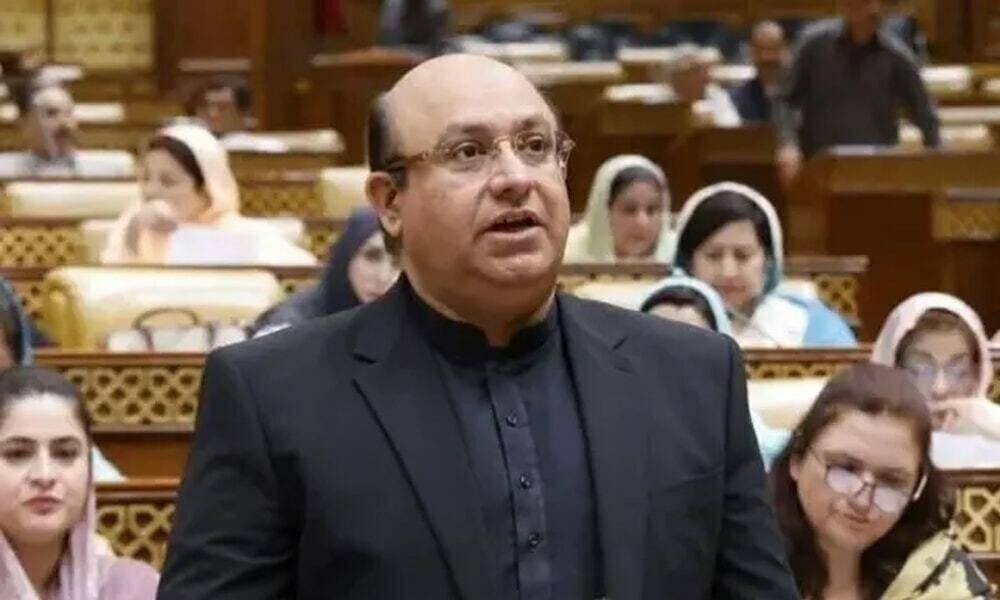PTBP Web Desk
The Punjab Assembly was the site of heated debates and crucial discussions as several key legislative measures were presented.
Among the prominent items on the agenda were amendments to the Punjab Agricultural Income Tax 2024, a proposal to ban polythene shopping bags to mitigate environmental damage, and urgent calls for air purifiers to combat the ongoing smog crisis. Additionally, the issue of police accountability, particularly in the Katcha area, became a focal point during the session, with opposition members voicing strong concerns over corruption and rising criminal activities.
The session kicked off with the presentation of a draft bill aimed at amending the Punjab Agricultural Income Tax for 2024. Parliamentary Affairs Minister, Mujtaba Shuja-ur-Rehman, introduced the bill in the assembly, which seeks to introduce revisions to the existing agricultural tax system. The bill was referred to the relevant standing committee for further consideration, marking the beginning of discussions around the future of agricultural taxation in the province. These changes are part of the government’s ongoing efforts to streamline the taxation system and ensure fair contributions from the agricultural sector, which has historically remained under-taxed in Pakistan.
The introduction of the bill is seen as a critical step in addressing the fiscal challenges faced by the provincial government, as Punjab seeks to raise much-needed revenue to support its development goals. While the details of the proposed amendments are still being reviewed by the standing committee, stakeholders anticipate that the bill could have significant implications for landowners and farmers across the province.
In another significant development, Pakistan People’s Party (PPP) MPA, Neelum Jabbar, submitted a resolution calling for a complete ban on the use of shopping bags made from polythene. This resolution comes in response to growing environmental concerns over the widespread use of plastic bags, which contribute to significant pollution and harm agricultural productivity.
Polythene bags are notorious for their inability to decompose in soil, causing them to block the pores of the earth and obstruct the flow of air and water to crops. This, in turn, hampers agricultural productivity and damages the environment. The resolution urges the government to implement a ban on these bags to reduce plastic waste, promote sustainable practices, and protect Pakistan’s natural resources. The move reflects a broader global shift toward eco-friendly alternatives to plastic, as countries around the world grapple with the harmful effects of single-use plastics.
As the debate surrounding environmental protection intensifies, this resolution is expected to gain traction, with environmental activists and concerned citizens supporting the move. Proponents argue that a ban on polythene bags would help mitigate the escalating pollution levels and improve the quality of life in both urban and rural areas.
The assembly session also addressed the critical issue of smog, which has been wreaking havoc on public health across Punjab. Opposition member, Rana Aftab Ahmed Khan, raised a point of order calling for the installation of air purifiers within the Punjab Assembly building to combat the harmful effects of smog, which has led to over 35,000 hospitalizations in the region. He highlighted that high-rise buildings in the province are now required by the Environmental Department to install air purifiers, and suggested that the same measure should be applied to the assembly itself.
The recommendation was made in light of the deteriorating air quality in the province, where smog has reached alarming levels. The opposition member’s call for air purifiers was seen as a practical response to the growing public health crisis. The installation of air purifiers in the Punjab Assembly would not only improve the working conditions for assembly members and staff but also set an example for other public buildings to follow.
The rising toll on human health and the ongoing strain on medical resources have made it clear that urgent steps need to be taken to address the smog problem. Air purifiers are a potential solution to help reduce the harmful effects of smog and protect the well-being of those working in affected areas.
During the session, government member Amjad Ali Javed raised concerns about the country’s economic struggles and the ongoing discussions about increasing salaries for public servants. Javed pointed out the recent salary increases for judges, highlighting the disparity between the judicial pay hikes and the economic challenges faced by ordinary citizens. As many government institutions continue to face budget cuts and layoffs in an effort to save funds, Javed expressed the need for a more equitable approach to salary increases.
Another hot topic during the session was the allocation of plots for industrial estates. Speaker Malik Muhammad Ahmad Khan questioned the authority of the Faisalabad Industrial Estate Development Management Company (FIEDMC) Chairman, Mian Ans Jaan, regarding the allocation of an expensive plot for a factory. The Speaker requested clarification on whether proper procedures had been followed in the allocation of such a prime plot, emphasizing the need for transparency and justification.
Opposition member Sardar Muhammad Awais Dreshak proposed the establishment of an industrial estate in Rajanpur and Kot Mithan, arguing that these areas, located along the China-Pakistan Economic Corridor (CPEC) route, could become key hubs for business activity in the future. This suggestion is part of broader efforts to promote economic development in underdeveloped regions of Punjab and create job opportunities for local communities.
PPP MPA Mamtaz Chang raised serious concerns about corruption within the police force in the Katcha area, a region notorious for its criminal activities. Chang presented evidence against corrupt SHOs and warned that if no action was taken, he would consider resigning from his position. He criticized the government’s inaction on rising crime, particularly kidnappings and robberies in Sadikabad and Nawababad, and expressed frustration at the false reports submitted to the assembly regarding police deployments in the area.
Chang’s passionate speech drew attention to the growing issue of corruption and lawlessness in the Katcha area, where police have struggled to maintain control over criminal gangs. His call for greater accountability within law enforcement echoed broader concerns over the failure to address public safety issues in Punjab’s rural regions.




